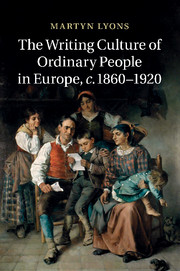Book contents
- Frontmatter
- Contents
- Illustrations
- Maps
- Acknowledgements
- Note on translations and transcriptions
- 1 Ordinary writings, extraordinary authors
- 2 Archives for an alternative history
- 3 ‘Excuse my bad writing’
- 4 Literary temptations
- 5 France
- 6 France
- 7 Family, village and motherland in the writing of Italian soldiers, 1915–1918
- 8 Italian identities ‘from below’ and ordinary writings from the Trentino
- 9 Love, death and writing on the Italian front, 1915–1918
- 10 Spain
- 11 Family strategy and individual identities in the letters of Spanish emigrants
- 12 Order and disorder in the ‘memory books’
- 13 Conclusions
- Bibliography
- Index
- References
1 - Ordinary writings, extraordinary authors
Published online by Cambridge University Press: 05 November 2012
- Frontmatter
- Contents
- Illustrations
- Maps
- Acknowledgements
- Note on translations and transcriptions
- 1 Ordinary writings, extraordinary authors
- 2 Archives for an alternative history
- 3 ‘Excuse my bad writing’
- 4 Literary temptations
- 5 France
- 6 France
- 7 Family, village and motherland in the writing of Italian soldiers, 1915–1918
- 8 Italian identities ‘from below’ and ordinary writings from the Trentino
- 9 Love, death and writing on the Italian front, 1915–1918
- 10 Spain
- 11 Family strategy and individual identities in the letters of Spanish emigrants
- 12 Order and disorder in the ‘memory books’
- 13 Conclusions
- Bibliography
- Index
- References
Summary
The importance of writing
Writing was once an instrument of oppression and a cultural practice confined to social and political elites; but by the end of the nineteenth century it had become indispensable at every level of European society. Handwriting is now a lost art, but in the late nineteenth and early twentieth centuries it served a range of essential functions. Writing by hand was essential for personal communication at a distance, for business transactions and for maintaining family networks. Faithful supplicants sent prayers to heaven in writing, while pastors and confessors recommended writing as part of the individual’s spiritual development, so that self-writing became a crucial instrument in the examination of the Christian conscience. Subjects and citizens used writing to petition or insult their governments. Through writing, one managed family problems, conducted love affairs and tried to keep one’s budget under control. In the twenty-first century, we are in danger of underestimating its importance, because the intense and widespread scribal culture of that period has all but disappeared. Today, personal writing has been relegated to a private and domestic universe of shopping lists and hastily scribbled mobile phone numbers. But in a world before telephones, emails and text messaging, writing sustained daily life and human contact. The résumés of today’s job applicants list their skill and experience with the latest computer software programs; but their nineteenth-century equivalents had to demonstrate good handwriting as the essential professional asset for any clerical or professional employment. In the 1840s, for example, the future American novelist Herman Melville could not get a job in Manhattan because his handwriting was too poor. Men away on business trips wrote home daily, soldiers in the trenches wrote almost as frequently to their relatives and loved ones, and emigrants across the oceans kept in contact with their family of origin through writing. Middle-class spouses even wrote to each other when they were not separated, the husband having notes delivered to his wife while she was busy in another room of their spacious residence.
- Type
- Chapter
- Information
- Publisher: Cambridge University PressPrint publication year: 2012



